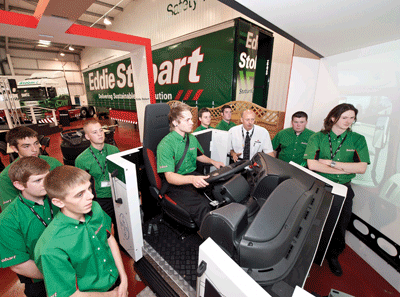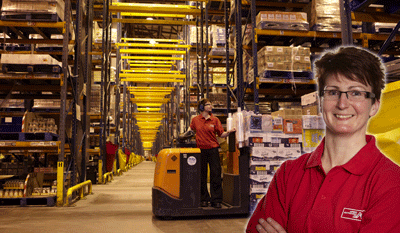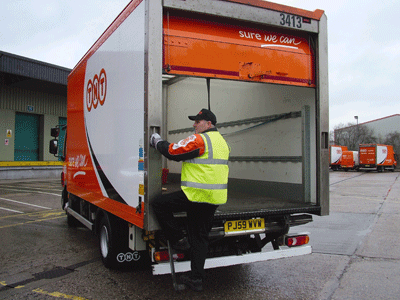
Eddie Stobart
Recognising a need to identify, nurture and develop emerging leaders within the company, Stobart Group designed a Management Development Programme (MDP) and First Line Manager course, launching both in September 2010.
All MDP delegates are mentored one-on-one by a Stobart company director throughout the programme while completing a mixture of training courses, job placements and work-based projects. FLM delegates also work through a bespoke programme, taking part in formal training and creating their own personal development plan.
The majority of courses are delivered in-house and the programmes are fully supported by senior members of Stobart Group. An annual review event for delegates, featuring a ‘meet the directors’ opportunity, gives delegates the chance to discuss ideas with divisional MDs and heads of departments.
Successful completion of the MDP results in a Diploma in Professional Development worth 80 university-grade CAT points; FLM delegates obtain 20 CAT points in a Level 2 NVQ in Team Leadership. Both programmes are accredited by Coventry University.
Judges said it was fantastic to see the directors taking a hands-on approach and directly mentoring each MDP candidate. They also liked the job placements in different areas of the business and felt the training had "good external verification".
Norbert Dentressangle

With a target of filling 60% of its senior management positions from within the business, Norbert Dentressangle (ND) has implemented a bespoke Management Development Programme (MDP) aimed at first line managers or supervisors with the potential to develop into exceptional managers.
The course content is built around the values of the business, focusing specifically on the challenges faced by its managers.
The programme comprises six modules delivered over 12 months and delegates are tasked with making £4,000 cost savings at their respective sites to make the training ‘self-funding’.
In 2011, 19 MDP delegates achieved combined savings of £779,120, an increase on the £450,700 achieved by candidates in 2010.
Of those who have completed the MDP programme, 49% have been promoted.
ND also highlighted its driver training schemes in its entry but the judges were most impressed with its management programme, describing it as "well tailored" and "great for potential leaders". The judges commented that the six modules were clearly beneficial to the business: Managing Yourself, Managing Teams, Managing Individuals, Commercial Acumen, Providing Legendary Customer Service, and Achieving Peak performance.
Suckling Transport

Specialising in the distribution of fuel for 25 years, Suckling Transport today delivers nearly two billion litres of inflammable liquid in the UK each year. So training, particularly in safety, is an integral part of the business. But, in a sector dominated by multi-national logistics providers, an SME like Suckling needs to differentiate itself. Cue what it calls ‘Intervention Training’.
After many years of driver training systems based on periodic in-cab assessment and corrective training, Suckling Transport decided to change its approach.
In 2009, Suckling engaged Tom Taylor, training manager for US-based Smith System which specialises in collision avoidance driver training, for a ‘train the trainer’ week at its HQ in Essex. Tom produced a Driver Instructor Team of six employees, charged with improving the skills of Suckling’s 128 LGV road tanker drivers. Over the next two years, every employee underwent defensive driver training.
In 2011, the same team of instructors underwent refresher training and were asked to create ways to improve driver skills through intervention rather than periodic training. This led to the introduction of Suckling’s Skills Builder Programme which uses the date from Suckling’s on-board telematics to target intervention training to correct any skills deficiency that occurs. The company constantly monitors six specific areas of driving skills reported by the telematics: fuel economy, speeding, engine idle time, sweet spot driving, over revving and harsh braking.
Judges were impressed by the "training journey" Suckling had been on.
TNT UK

A review of new entrants to its warehouse operation, where over 2,700 employees work as loading bank operatives, revealed to TNT that only 10% of new starters held qualifications at or above Level 2 NVQ, compared to the industry norm of 52% (Skills for Logistics).
The implementation of the Agency Workers Directive (AWR) in October 2011 presented TNT with the opportunity to redesign its induction approach and engage new employees through a formalised induction and training process.
TNT linked its new induction programme to a Level 2 NVQ in Mail Services. The programme consisted of 14 modules with ongoing assessment concluding in around 18 weeks and using a train assess model which lead to additional coaching by colleagues as required.
Moving away from a check-list induction process has resulted in 70% employee engagement overall (a 4.5% year-on-year improvement) and a reduction in lost time accidents of 9.09%, representing a saving of £16,000.
TNT says the programme has energised its talent wave and makes TNT more attractive to people looking for a job.
Judges were impressed by the high level of staff engagement and felt the new programme was very well structured.
United Biscuits Logistics

The United Biscuits Logistics (UBL) entry details the firm’s three core areas of focus with regard to training: behavioural health and safety; driver training; and lean thinking and business improvement techniques.
As the in-house own account arm for United Biscuits, UBL has a staff of 310 based at its NDC in Ashby de la Zouch. Following the launch of its SafeStart safety awareness and safety skills training programme in 2009, UBL staff have achieved two consistent years of zero lost time accidents (2010 and 2011). To support and underpin its health and safety culture, UBL introduced Safety Champions – representatives from each function including – drivers, warehouse and office staff.
UBL has invested heavily in a range of driver training initiatives, which have clearly paid off as at the start of 2012, UBL announced that all 68 of its drivers had completed their final 7.5 hours of Driver CPC training – two years ahead of the legislative requirement.
In 2010, United Biscuits launched a lean manufacturing strategy with the aim to embed Lean Management principals throughout the business. The UBL team embraced this programme and developed an NVQ 2 in Business Improvement Techniques which is open to all logistics team members, drivers and salaries staff. So far 56 logistics team members have completed the NVQ.
Judges said UBL’s entry clearly demonstrated year-on-year improvements and overall was a good strategy.











